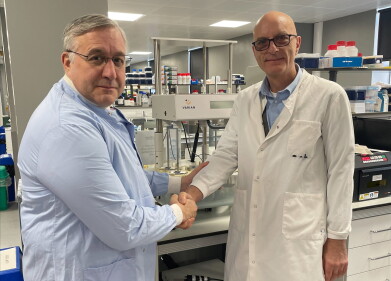News
Collaboration to advance graphene sensors for quantum computing
Feb 28 2025
The University of Birmingham has partnered with Paragraf Ltd, a UK leader in graphene-based electronics, to accelerate the mass production of graphene on six-inch wafers and explore its potential in quantum computing. This collaboration is supported by two significant funding awards: a £1.4 million grant from Innovate UK and a £2 million UKRI Future Leaders Fellowship.
Graphene, a material made of a single layer of carbon atoms, is renowned for its exceptional strength and electrical conductivity. Graphene-based sensors, which operate with unparalleled precision at ultra-low temperatures, hold immense promise for quantum computing, particularly in managing magnetic shielding and controlling qubit processors.
Despite its potential, scaling up graphene production and testing its performance at cryogenic temperatures has presented challenges. The emerging graphene electronics industry has yet to fully overcome these hurdles. However, this collaboration aims to address these issues and drive the commercialisation of graphene technology.
Dr Matt Coak, from the University’s School of Physics and Astronomy, will lead the Birmingham team, alongside Paragraf’s researchers. Dr Natasha Conway, Research Director at Paragraf, commented: “Graphene magnetic sensors could become a key enabler for quantum computing. The groundbreaking research at Birmingham is helping us prepare for this transformative market.”
He added: “Cryogenic testing of graphene devices has not been conducted at this scale. We are venturing into unknown territory to understand how graphene behaves in the extreme conditions required for quantum computing.”
Simon Thomas, Co-Founder and CEO of Paragraf, said: “The future of electronics depends on advanced materials like graphene. By scaling up production of real-world devices for quantum computing, battery management, and other fields, we are paving the way for a sustainable, materials-driven revolution. This innovation right here in the UK positions the country to lead in advanced materials.”
The partnership utilises Birmingham's expertise in low-temperature testing, nanotechnology, and quantum computing, alongside Paragraf’s advanced graphene manufacturing capabilities. The funding will enable further exploration of new 2D materials and the development of cutting-edge electronic devices. Together, the team aims to discover new quantum states within these materials and create new technologies that could revolutionise quantum computing and beyond.
Dr Coak further explained the significance of the University’s role: “At the School of Physics and Astronomy, we are conducting rigorous testing of graphene magnetic field sensors for quantum computers and electric vehicle battery management. We are also delving into the fundamental quantum physics of graphene and developing theoretical models to better understand its electronic behaviour.”
The partnership is a significant step toward commercialising graphene technology, with the potential to reshape quantum computing and numerous other industries.
More information online:
Digital Edition
ILM 50.2 March 2025
March 2025
Chromatography Articles - Effects of small deviations in flow rate on GPC/SEC results Mass Spectrometry & Spectroscopy Articles - Waiting for the present to catch up to the future: A bette...
View all digital editions
Events
Apr 09 2025 Tokyo, Japan
Apr 22 2025 Hammamet, Tunisia
Apr 22 2025 Kintex, South Korea
Analytica Anacon India & IndiaLabExpo
Apr 23 2025 Mumbai, India
Apr 23 2025 Moscow, Russia



















